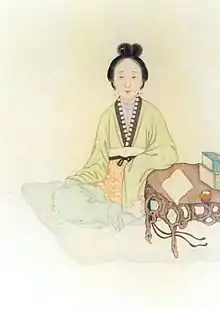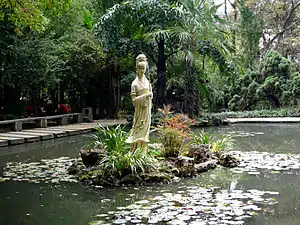Chen Yuanyuan
Chen Yuanyuan (1624–1681)[1] was a courtesan who lived during the late Ming and early Qing dynasties. She was the concubine of Wu Sangui, the Ming dynasty general who surrendered Shanhai Pass to the Manchu Qing dynasty, and later rebelled in the Revolt of the Three Feudatories. Chen's life and relationship to Wu later became the subject of a number of popular stories and legends, many of them focusing on her supposed role in Wu's fateful decision to defect to the Qing, thereby sealing the fate of the Ming dynasty.
| Chen Yuanyuan | |
|---|---|
 A 17th-century portrait of Chen Yuanyuan | |
| Born | Xing Yuan 1624 Jiangsu, Ming Empire |
| Died | 1681 (aged 56–57) Qing Empire |
| Spouse | Wu Sangui |
| Occupation | courtesan |
| Chen Yuanyuan | |||||||||
|---|---|---|---|---|---|---|---|---|---|
| Traditional Chinese | 陳圓圓 | ||||||||
| Simplified Chinese | 陈圆圆 | ||||||||
| |||||||||
| Xing Yuan (birth name) | |||||||||
| Chinese | 邢沅 | ||||||||
| |||||||||
| Wanfen (courtesy name) | |||||||||
| Chinese | 畹芬 | ||||||||
| |||||||||
Biography
Chen Yuanyuan was born to a peasant family in Jiangsu province, and on the death of her father, she became a courtesan. Chen became a leading figure in the Suzhou opera scene.[2] In 1642, she became the lover of the scholar and poet Mao Xiang.[3] Subsequently, Chen was bought by the family of Tian Hongyu, father of one of the Chongzhen Emperor's concubines. She was then either purchased for Wu Sangui by his father,[4] or given to Wu as a gift by Tian.[5]
She is one of the Eight Beauties of Qinhuai described by late Qing officials. The other famed courtesans of this group are Ma Xianglan, Bian Yujing, Li Xiangjun, Dong Xiaowan, Gu Mei, Kou Baimen, and Liu Rushi.[6]
After failing to deter Wu Sangui's rebellion, Chen asked General Ma Bao to escort her and her son with Wu Sangui, Wu Qihua, to what is now known as the Majia Zhai village in Guizhou, where they would hide amongst the ethnic minorities who were hostile to Qing rule.[3] Seen as a connection to a failed uprising, this knowledge was subsequently only passed down by oral history until the 20th century, when it was published by historian Huang Tousong.[3] The inscription on the tombstones were intentionally cryptic to deter detection throughout the years but has been confirmed by government historians in 2005.[3] Locals believe that she retired as a nun later in life.[3]
In fiction

In April 1644, the rebel army of Li Zicheng captured the Ming capital of Beijing, and the Chongzhen Emperor committed suicide. Knowing that Wu Sangui's formidable army at Ningyuan posed a serious threat, Li immediately made overtures to gain Wu's allegiance. Li sent two letters to Wu, including one in the name of Wu's father, then held captive in Beijing. Before Wu Sangui could respond, he received word that his entire household had been slaughtered.[7] Wu then wrote to the Qing regent, Dorgon, indicating his willingness to combine forces to oust the rebels from Beijing, thus setting the stage for the Qing conquest of China proper.[8]
In popular lore, however, Chen Yuanyuan takes a more dramatic and romanticized role in these pivotal events. According to stories that emerged in the Kangxi era, Wu Sangui's motivation for joining forces with the Qing to attack Li Zicheng was that Li had abducted and (by some accounts) raped Chen, Wu's beloved concubine. This version of the tale was made famous by Wu Weiye's qu, the Song of Yuanyuan:[9]
In that time when the emperor abandoned the human world,
Wu crushed the enemy and captured the capital, bearing down from Jade Pass.
The six armies, wailing and grieving, were uniformly clad in the white of mourning,
One wave of headgear-lifting anger propelled him, all for the sake of the fair-faced one.
The fair-faced one, drifting, and fallen, was not what I longed for.
The offending bandits, smote by heaven, wallowed in wanton pleasures.
Lightning swept the Yellow Turbans, the Black Mountain troops were quelled.
Having wailed for ruler and kin, I met her again.
Although such stories tying the downfall of the dynasty to the relationship between Wu and Chen proved popular, modern historians generally regard them as having been later products of popular fiction, not historical fact.[11][12][13][14] By some accounts, Chen Yuanyuan survived the fall of Beijing and was subsequently reunited with Wu Sangui. One story claims that later in life, she changed her name and became a nun in Kunming after Wu Sangui's failed rebellion against the Qing.[15] This story may also be a later fabrication, or popular folklore.[16][17]
References
- Peterson 2000
- Lee & Stephanowska 1998
- "The Chinese village that kept a courtesan's secret for centuries". South China Morning Post. 2019-05-10. Retrieved 2019-12-14.
- Lee & Stephanowska 1998
- Peterson 2000
- Xie & Shi (2014), p. 181.
- Wakeman Jr. 1986, pp. 291,295
- Wakeman Jr. 1986, p. 300
- Wakeman Jr. 1986, pp. 292–294
- Chang & Owen 2010, p. 179
- Wakeman Jr. 1986, pp. 292–294
- Spence 1990, p. 33
- Huang 1997, p. 205
- Lovell 2006, p. 252
- Peterson 2000
- Lee & Stephanowska 1998, p. 25
- Wakeman Jr. 2009, p. 123
Bibliography
- Chang, Kang-i Sun; Owen, Stephen (2010), The Cambridge History of Chinese Literature, Volume 2, Cambridge University Press, ISBN 978-0-521-85559-4, retrieved 2015-05-14
- Huang, Ray (1997), China: A Macro History, M. E. Sharpe, ISBN 978-1-56324-731-6
- Lee, Lily Xiao Hong; Stephanowska, A.D. (1998), Biographical Dictionary of Chinese Women: The Qing Period, 1644-1911, East Gate, pp. 21–26, ISBN 0-7656-0043-9, retrieved 2015-05-14
- Lovell, Julia (2006), The Great Wall: China Against the World, 1000 BC-2000 AD, Atlantic Books, ISBN 9781843542124
- Peterson, Barbara Bennett (2000), Notable Women of China: Shang Dynasty to the Early Twentieth Century, East Gate, pp. 330–334, ISBN 0-7656-0504-X, retrieved 2015-05-14
- Spence, Jonathan D. (1990), The Search for Modern China, W. W. Norton & Company, ISBN 9780393307801
- Wakeman Jr., Frederic (1986), The Great Enterprise: The Manchu Reconstruction of Imperial Order in Seventeenth-century China, Berkeley: University of California Press, ISBN 0520048040
- Wakeman Jr., Frederic (2009), Telling Chinese History: A Selection of Essays, Berkeley: University of California Press, ISBN 9780520256064
- Xie 谢, Yongfang 永芳; Shi 施, Qin 琴 (2014). "像传题咏与经典重构———以《秦淮八艳图咏》为中心" [Acclaim for portraits and classical reconstruction: 'Qinhuai bayan tuyong' as the centre]. Zhongguo Wenhua Yanjiu (2): 180–188.
See also
- The Deer and the Cauldron, a wuxia novel by Jin Yong in which Chen appears.
- The Green Phoenix: A Novel of the Woman Who Re-made Asia, Empress Xiaozhuang, a historical novel by Alice Poon in which Chen has a minor role.
- Tales of Ming Courtesans, a historical novel by Alice Poon in which Chen is one of the three protagonists, the other two being Liu Rushi and Li Xiangjun.